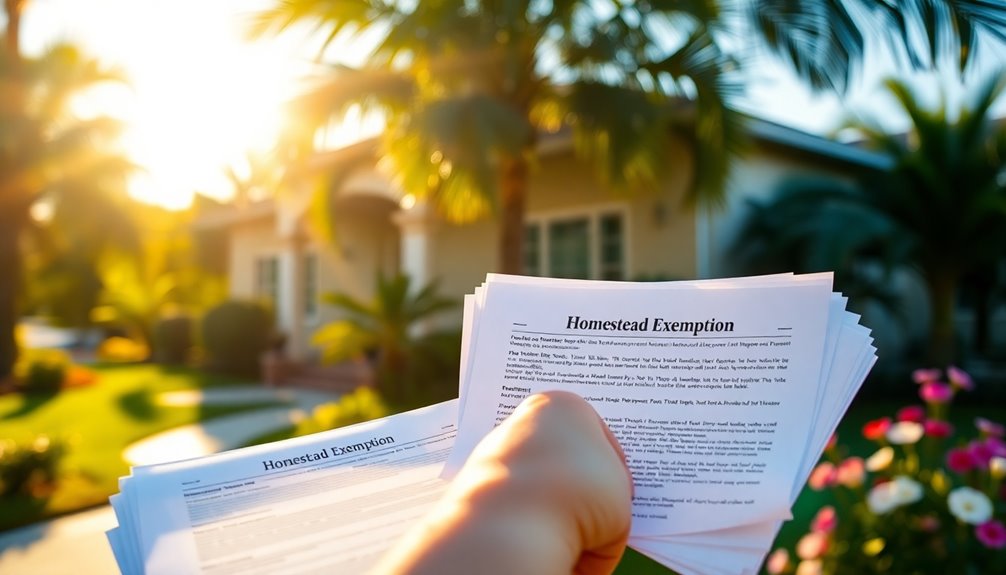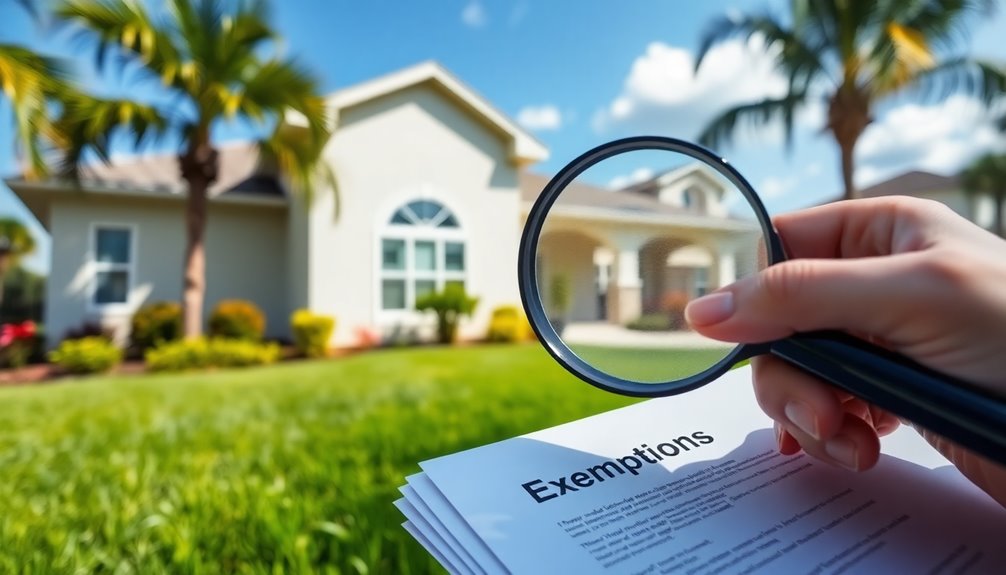To lower your property taxes in Florida, start by applying for the Homestead Exemption, which can reduce your assessed value by up to $50,000. Make sure you gather the necessary documents such as proof of ownership and residency, and apply using Form DR-501 by March 1 each year. Explore additional exemptions—you may qualify for benefits based on age, disability, or veteran status. Don't forget about portability benefits that let you transfer tax savings to a new home. There's always more to know about maximizing your savings, so consider your options and stay informed.
Key Takeaways
- Apply for the Homestead Exemption to reduce your assessed value by up to $50,000, saving on property taxes.
- Ensure accurate completion and timely submission of Form DR-501 by March 1 each year for the exemption.
- Explore additional exemptions for seniors, disabled individuals, and veterans to further lower your property tax bill.
- Regularly review property value assessments and consider appealing if you believe your property is overvalued.
- Utilize portability benefits to transfer tax savings when moving to a new homestead, maximizing your exemption advantages.
Understand Homestead Exemption

To lower your property taxes in Florida, it's essential to understand the Homestead Exemption. This exemption is available if you own and reside on your property as of January 1st. You, along with your spouse, must occupy the home and treat it as your primary residence.
To qualify, you need legal or equitable title to the property and an intention to make it your permanent home. Even military personnel and their dependents can take advantage of this benefit. The exemption can reduce your property's assessed value by up to $50,000. The first $25,000 applies to all property taxes, including those for schools, while the additional $25,000 applies to the assessed value between $50,000 and $75,000, but only for non-school taxes.
Applying for the Homestead Exemption is straightforward; you can do it online or through mail, fax, or in person using the Department of Revenue Form DR-501. Approved exemptions renew automatically each year, making it easier for homeowners to maintain their benefits without reapplying.
This exemption significantly reduces your taxable property value, leading to lower property tax bills. Many Florida homeowners claimed this exemption in recent years, saving an average of $1,046, especially in areas with high property values.
Gather Required Documentation

Gathering the necessary documentation is crucial for successfully lowering your property taxes in Florida. Start by collecting essential property information, like the address, parcel ID number, and the county where your property is located. If applicable, include details about any previous homestead property, such as the date it was sold or no longer used.
Next, compile your financial and ownership documents. You'll need proof of ownership, such as a deed or title, and proof of residency, like utility bills or your driver's license. Additionally, be aware that filing an appeal is available to all homeowners, which can further assist in the tax reduction process.
Don't forget to gather financial records that support your exemption claims, documentation of any property improvements, and records of past tax assessments.
Identify relevant exemptions you might qualify for, like the homestead exemption, Save Our Homes assessment limitations, or additional exemptions for veterans, seniors, and the disabled.
Make sure you have the necessary documentation to back these claims, including any deadlines for filing applications.
Finally, prepare evidence for tax assessment appeals by comparing market values of nearby properties, taking photos of your property's condition, and gathering any relevant appraisal reports.
Having all this documentation ready will streamline the process and boost your chances of lowering your property taxes.
Complete the Application Process

Once you have all your documentation ready, it's time to complete the application process. Start by using Form DR-501 for the Florida Homestead Property Tax Exemption. Make sure to submit the form to the property appraiser in your county, keeping in mind that the typical deadline is March 1.
Check for any exceptions specific to your county, and ensure all required sections are filled out accurately to avoid delays or rejection. Additionally, ensure you provide proof of permanent residence to confirm your eligibility for the exemption.
After completing the form, submit it to the local property appraiser's office. You can do this in person, by mail, or through online portals if your county offers them. Always verify the accepted submission method for your specific county.
It's a good idea to keep a copy of the submitted application for your records.
If you're married, include both spouses' information, such as Social Security Numbers. Be prepared to provide previous residence information, employment verification, and documents showing your permanent residence address.
Make sure all your documents align with the address claimed on the application. Following these steps will help ensure your application is processed smoothly, increasing your chances of receiving the exemption.
Explore Exemption Amounts

Understanding the exemption amounts available can significantly impact your property tax savings in Florida. The exemption structure starts with the first $25,000 of your property's assessed value being exempt from all property taxes, including school district taxes.
The next $25,000 is taxable, while an additional $25,000 exemption applies to values between $50,000 and $75,000, exempt from non-school taxes. If your property is valued above $75,000, only the remaining value is fully taxable.
To qualify, you must hold legal title to the property by January 1, and it must be your permanent residence. You'll need to record the deed and provide proof of your social security number, a valid Florida driver's license or ID, and updated vehicle registrations. Many exemptions have automatic renewal, which can simplify your tax savings process.
These exemptions can reduce your taxable property value by up to $50,000, leading to significant savings. For example, homeowners saved an average of $1,046 in 2022.
Knowing how these amounts work and ensuring you meet the eligibility requirements can greatly lessen your overall tax burden, particularly in areas with high property values.
Investigate Additional Exemptions

In Florida, several additional exemptions can significantly reduce your property tax burden beyond the standard homestead exemption.
If you're 65 or older, you may qualify for an additional $50,000 homestead exemption, which can lead to substantial savings. Disabled individuals, such as the legally blind or those bound to a wheelchair, can receive a 100% exemption through the income-limited program. Quadriplegic individuals are also eligible for a full exemption.
Veterans and military personnel have specific exemptions as well. For example, if you're a veteran with a combat-related disability and over 65, you could receive a property tax discount based on your disability percentage. Additionally, veterans with a 10% disability or greater can receive a $5,000 exemption.
If you've been deployed outside the continental U.S., you can apply for a deployed military exemption, but you'll need to provide documentation.
Additionally, surviving spouses of first responders who died in the line of duty can obtain a total exemption on their homestead property.
Learn About the Tax System

Florida's property tax system can seem complex, but breaking it down into key components makes it easier to navigate. The assessment process begins on January 1, when assessors determine your property's market value by analyzing sales of similar properties and conducting site visits. They then apply assessment differentials, like the Save Our Homes cap, to establish your assessed value.
Your taxable value is calculated by subtracting any exemptions from the assessed value. Taxing authorities set millage rates based on their budget needs, which are reflected in the TRIM notice you receive in August. This notice outlines the proposed millage rates and public hearing dates, where you can voice your concerns. It's important to remember that the tax cycle resets annually in January, impacting how property values are assessed.
Once the tax bill is finalized, you'll receive it in late October or early November, with payment due by March 31. You can take advantage of early payment discounts ranging from 4% to 1%.
Utilize Portability Benefits

Portability benefits can be a game-changer for homeowners looking to minimize their property taxes in Florida. If you've got a homestead exemption on your current residence, you may qualify to transfer the accumulated "Save Our Homes" benefit from a previous homestead to a new one.
This opportunity applies to properties sold or changed homesteads after 2008 and allows you to preserve tax benefits even when moving within the state. Additionally, you can carry over the tax savings from your previous property, enhancing your financial flexibility.
To take advantage, make sure at least one owner of the old property is also an owner of the new one. You can even convert a non-homesteaded property into a homestead and transfer benefits.
Just remember to complete Form DR-501T alongside your homestead application (Form DR-501) by March 1 each year.
You can transfer up to $500,000 in benefits, leading to significant tax savings, especially if your previous home saw considerable value increases.
Don't forget, you have three years to make the transfer after abandoning your old homestead. Take the time to explore portability—it could mean substantial savings on your property taxes.
Frequently Asked Questions
How Can I Check My Property Tax Assessment?
To check your property tax assessment, start by visiting your county's Property Appraiser's website.
Use the property search feature, entering your address or owner's name. Some counties might require you to create an account for detailed access.
Once you find your property, review the assessed value, exemptions, and taxable value.
If you need more help, consider visiting the local office in person, bringing necessary documents for assistance.
What Happens if I Miss the Application Deadline?
If you miss the application deadline for property tax exemptions, you'll face higher taxes for that year.
Unfortunately, you won't be eligible for benefits like homestead or senior citizen exemptions until the next filing period.
You can appeal a denied exemption, but it won't change the missed deadline.
This oversight could cost you thousands, so it's crucial to stay on top of deadlines to avoid unnecessary financial strain.
Can I Appeal My Property Tax Assessment?
Yes, you can appeal your property tax assessment. Start by checking if the assessed value aligns with your property's actual worth.
If you spot discrepancies, gather evidence like appraisals and comparable property listings.
First, request an informal conference with the property appraiser. If that doesn't resolve the issue, file a petition with the Value Adjustment Board.
Remember to do this within 25 days of receiving your Truth in Millage notice to ensure your appeal is valid.
How Does Property Tax Affect Homeowners Insurance Rates?
Property tax itself doesn't directly impact homeowners insurance rates, but there's an indirect connection.
As property values rise, which can happen with increased taxes, your insurance premiums may also go up due to higher rebuilding costs.
Since both property taxes and insurance are managed through an escrow account, any increase in one can lead to higher monthly mortgage payments.
It's essential to understand how these factors interplay to manage your overall expenses effectively.
Are There Any Penalties for Late Property Tax Payments?
Yes, there are penalties for late property tax payments.
If you don't pay by March 31, your taxes become delinquent on April 1, and a 3% penalty is added immediately. This penalty increases by 3% each month, along with advertising costs.
Interest also begins accruing on unpaid taxes from April 1.
Eventually, if payments aren't made, you could face a tax certificate issuance and potential foreclosure proceedings.
Conclusion
By understanding the homestead exemption and gathering the right documentation, you can take significant steps to lower your property taxes in Florida. Completing the application process and exploring additional exemptions can further boost your savings. Don't forget to utilize portability benefits if you're moving, as they can help maintain your tax savings. Stay informed about the tax system, and you'll be better equipped to manage your property taxes effectively. Start taking action today!









